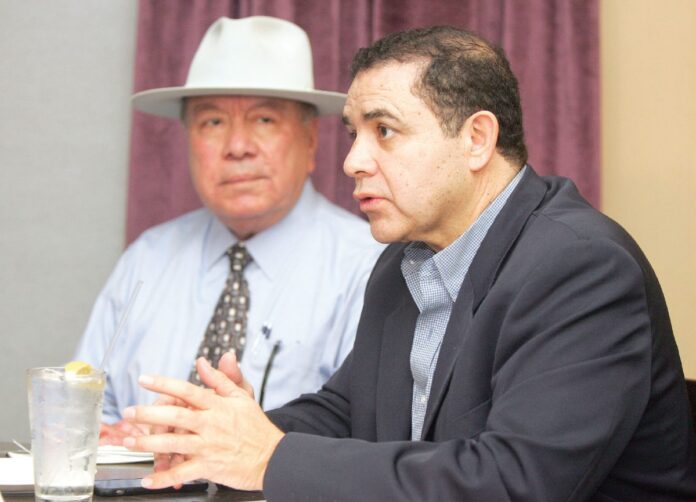McALLEN — With the threat of a second government shutdown in as many months mere days away, congressional leaders are hunkering down to negotiate a deal on protection for more than 700,000 undocumented youth this week.
U.S. Rep. Henry Cuellar, D-Laredo, held a meeting with the media Monday to discuss last week’s bipartisan negotiations with President Donald Trump and other congressional leaders on the Deferred Action on Childhood Arrivals program, and of his hope of coming to a deal by Friday’s government spending deadline.
Cuellar said a deal on DACA is possible, but whether this happens by Friday remains to be seen. Either way, Cuellar said he expects to avoid a shutdown of the government with the introduction of another continuing resolution, which would buy them about a month to continue negotiations.
“Can we get a deal done before Jan. 19 — possible, if we stick to what the plan was at the White House (meeting),” Cuellar said. “The Democrats are looking at whether we vote no to put pressure on Republicans — and some of us might vote no — but if it’s going to shut down the government some of us will change the vote because I don’t want to see the government shutdown. I’m not for shutting the government down for any reason.”
But, he said, Republicans have not stood by the four issues agreed upon in the meeting with the president.
The four issues reportedly settled on, referred to as Phase 1, are a replacement for DACA, border security, “chain migration,” and diversity VISAs. Instead, he said Republicans recently added more than 20 items they wanted to include in the talks, saying they would fall under the umbrella of border security issues.
“When I asked (Republicans), ‘What are you doing?’ They said it’s border security — it’s not border security,” Cuellar said.
Trump, who rescinded DACA in early September, appeared optimistic about a deal for recipients — otherwise referred to as Dreamers — just last week during the aforementioned meeting with bipartisan members of congress.
But his tone on the matter appeared to shift, when U.S. District Judge William Alsup in San Francisco temporarily blocked the Trump administration’s decision to phase out the program.
Alsup granted a request by the state of California, the University of California and other plaintiffs to stop Trump from ending DACA on March 5.
The administration’s decision to end DACA, which was announced in September 2017, was based on a “flawed” legal analysis, Alsup wrote in his decision.
Dreamers would be irreparably harmed if their DACA protections, which allow them to live and work legally in the United States, were stripped away before the courts had a chance to fully consider their claims, he ruled.
That ruling came down hours after a meeting between Trump, U.S. House Appropriations Committee members and the Homeland Security Subcommittee to discuss DACA which appeared to end with optimism from both the president and those attending the meeting.
Trump, who was responding to reports that he had used vulgar language to describe immigrants from African countries, tweeted early Sunday that the program is “probably dead” and blamed Democrats. He elaborated on the way to dinner Sunday night with House Majority Leader Kevin McCarthy, R-Calif., saying Democrats “don’t want to help the DACA people.”
Some Democrats have threatened to vote against legislation to extend government funding, which expires Friday, unless protections for the Dreamers are included.
“ Honestly, I don’t think the Democrats want to make a deal,” Trump said. “I think they talk about DACA, but they don’t want to help the DACA people.”
Trump said Democrats aren’t for securing the border or stopping the flow of drugs, but are for taking money away from the military.
“We have a lot of sticking points but they’re all Democrat sticking points,” the president said. “We are ready, willing and able to make a deal, but they don’t want to.”
The congressman said he and other representatives are working together on a solution and disputed Trump’s assertion.
“They’re using the military and trying to put the blame on us,” Cuellar said. “Last time I counted, the Republicans control the Senate; the Republicans control the House. … We’re the minority. We don’t control any of the three branches, but the president is trying to put that on us.”
Cuellar’s appearance Monday comes on the heels of Majority Whip and Sen. John Cornyn’s visit to the Rio Grande Valley, in which he both criticized and lauded the president on a myriad of topics, including the North American Free Trade Agreement and the tax-overhaul bill.
Cornyn, who made a few stops during this stay in the Valley on aFriday, said he felt optimistic about a deal for Dreamers.
“You’d have to have a pretty hard heart not to have sympathy for 124,000 DACA recipients in Texas alone,” said Cornyn, who visited the Santa Ana National Wildlife refuge, where a border wall may be constructed, during his visit to the Valley. “They make a valuable contribution to our state.”
Although he was previously open to the idea of levee walls in some form in Hidalgo County, Cuellar said he would be opposed to the idea in Starr County where 32 miles of bollard wall is proposed.
The congressman said he would not be in favor of any fencing or wall that would harm the environment or put residents in a flood hazard — a concern of Starr County residents who live in areas government officials have preliminarily identified for wall construction.
“I again would ask for some redesign of what they want to do,” Cuellar said before stressing that walls should be kept from “environmentally sensitive areas,” such as Santa Ana, the National Butterfly Center and Bentsen-Rio Grande Valley State Park.
“But in Starr County,” Cuellar added, “there is no levee wall. It’s just a pure fence. So it’s a no.”
Bipartisan negotiations will continue throughout the week with the hope of reaching middle ground on a replacement for DACA.





